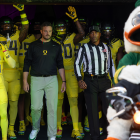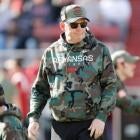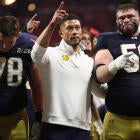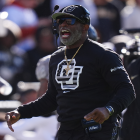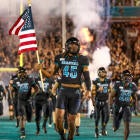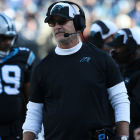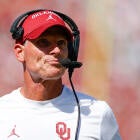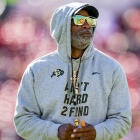
When No. 2 Ohio State takes the field in Eugene for Saturday's showdown with No. 3 Oregon, it will mark yet another potential turning point for a Ducks program that has had its fair share of "arrival" moments throughout the 21st century.
In terms of history, the game itself has already been etched into the record books as the first-ever matchup between top-three teams in Autzen Stadium. Previously, there had only been one matchup between teams ranked in the top six, but more on that 2007 game against Arizona State later.
The Buckeyes and the Ducks both entered the 2024 season as top-four teams in the rankings and the two most popular picks to win the newly expanded Big Ten. The expectation was that the chaotic conference title race in the new-look, 18-team league would pivot on the result of this Oct. 12 showdown between national title contenders. Now, we have arrived at the potentially historic moment with both teams having taken care of business against their early season opponents.
This game serves as an opportunity for Oregon, a truly 21st century program, to make another statement to the college football world at large. Because while we have gotten used to seeing Oregon on these massive stages, the Ducks don't always play the role of protagonist and rarely get to be college football's "main character." But maybe, against this juggernaut Buckeyes roster, Oregon is ready to meet the moment as college football's conquering superhero.
A 21st century power
The seeds for Oregon's modern success began with Rich Brooks, then at the end of a 17-year run as the Ducks head coach, handing the reins of the program to Mike Bellotti after winning a Pac-10 title in 1994. In the process of becoming the winningest coach in Oregon football history, Bellotti changed the conversation around the Ducks program from being a plucky regional threat to a true national power. He led Oregon to the school's first-ever 10-win season (four times) and finished in the top 12 of the final AP Top 25 poll four times between 2000-08 before, just like his predecessor, passing the coaching duties off to his offensive coordinator -- who in this case was Chip Kelly.
But it wasn't just the win counts or final rankings that put Oregon on the map. It was the moments. Autzen Stadium played host to affirming wins against blue blood programs like Michigan, which fell in 2003 as the No. 3 team in the country, and Oklahoma, which lost in Eugene as the No. 11 team in the country in 2006. There was a BCS snub in 2001 when Oregon was the No. 2 team in both major polls but landed outside the top two in the BCS formula. Yet, when Bellotti led the Ducks into the Fiesta Bowl against Colorado, little letdown was obvious in a 38-16 win.
Then there were the many moments involving Oregon and its role in the chaotic 2007 college football season. First came a 39-7 trouncing of Michigan in the Big House, then later in the season, back-to-back top-10 wins against USC and Arizona State that propelled the Ducks up to No. 2 in the country. Unfortunately, as many remember, the Arizona State win came with a cost as star quarterback Dennis Dixon suffered a knee injury in the win that would be re-aggravated two weeks later. That cost the Ducks a shot at competing for a national title.
So when Chip Kelly took over the program prior to the 2009 season, Oregon was in a much different place nationally. Big wins on big stages had made the Ducks a regularly featured part of the college football fabric, but even Kelly was able to find another level. With 46 wins in four seasons, highlighted by three conference titles and three top-four finishes, Kelly built upon Bellotti's foundation in record time and had the Ducks playing for a BCS National Championship in just his second year. Hitting the ground running with that kind of success is extremely uncommon, though interestingly enough, the latest example came from Kelly's current boss and former New Hampshire quarterback, Ryan Day.
All of this program growth, from zero 10-win seasons to playing for a national championship, happened overnight in the 150-year worldview of college football. Yet with the shortened memories we carry in 2024, the Ducks being a contender has become the norm. Still, the program has yet to ascend to carrying the role of favorite -- of being college football's main character and demanding that the sport's national title picture runs through Eugene, Oregon.
Best supporting actor of college football
Oregon fans have rosy memories of two wins against Michigan in a five-year span; of beating Oklahoma in 2006 in Autzen Stadium; or the magical ride of 2007 prior to Dixon's injury. But there are also scars from the program's rise and disappointment stemming from Ducks teams that have been unable — for one reason or another — to truly grab control of a season.
After the BCS snub in 2001 and the sudden halt of the 2007 run, Oregon continued to find itself as the best supporting actor of college football. The excellence and athleticism the Ducks were putting on display every single year was appreciated and celebrated, yet the conclusion of each season had another team standing in the spotlight.
Oregon spent seven weeks as the No. 1 team in the AP Top 25 in 2010 and carried a 12-0 record into the BCS National Championship. Chip Kelly was the national coach of the year and star running back LaMichael James finished third in the Heisman Trophy voting. Yet when we discuss the 2010 season, all conversations start (and some end) with the Heisman Trophy winner Cam Newton and the runaway train that was the 2010 title run for Auburn. Newton took up so much oxygen that Oregon's elite performance that year arguably went under appreciated at the time and definitely fails to resonate the way it probably should.
Four years and a coaching change later, Oregon again found itself in the thick of the national title hunt. The Ducks started the season with a thunderous statement win against Michigan State, then ranked No. 7 in the country, and later got to avenge their only regular-season loss with a win against Arizona in the Pac-12 title game to claim the No. 3 seed in the first-ever College Football Playoff. Oregon proceeded to roll over reigning champion Florida State in the Rose Bowl semifinal, but it yet again fell short in the national title game. We do remember Marcus Mariota fondly and continue to celebrate the excellence he showed en route to a Heisman Trophy win, but again the spotlight finished the season focused elsewhere. This time it was Ohio State, down to its third-string quarterback and led by Urban Meyer, stepping in to be the main character of 2014.
And while Michigan was undoubtedly the main character of 2023 in college football, a very good Oregon team found itself fighting for attention and respect even in its own region while playing second fiddle to Washington during the Huskies' wild ride all the way to being the national runner-up. The Ducks were on the losing end of two instant classics for the rivalry, losing by a combined six points in Seattle and in the Pac-12 title game. A handful of plays kept Oregon from being back in the playoff, where maybe the Ducks could have taken that last step for the program's first-ever national championship.
The man with the plan
These big-picture narratives aren't what's driving the people in the building in Eugene.
Dan Lanning is a process coach, and he knows that changing any big-picture narratives only happen with results -- and results don't come overnight. He's built a foundation for the program that values each step and takes a wholistic approach to what being a successful program requires from its players on and off the field. Lanning and the Ducks have capitalized on the modern tools of roster building with impressive use of the transfer portal and NIL. But as we've seen across the country, it's one thing to assemble talent and a whole other challenge to get them all to play together at a high level. The closer you get to Oregon's football team in 2024 the less big-picture the moment seems, and the national title-winning success of Lanning's process-driven mentors suggests he's not misguided in applying similar principles.
You know who is keenly aware of the big picture, though? The tens of thousands of Oregon fans who will be in Autzen Stadium on Saturday for one of the most-anticipated games in that building's 57-year history. The same goes for the hundreds of thousands of living alumni who have gotten the taste of big-time college football success over the last 25 years and sense what can be accomplished with one of the most talented rosters the program has ever seen. There's history at stake as well with the opportunity to win the Big Ten in Year 1 as a league member, and those conference title hopes will be explicitly put on the line against Ohio State on Saturday along with the implicit notion that Oregon is a top contender to compete for the national title in the expanded College Football Playoff.
Win or lose, there will still be many chapters left to be written in the story of the 2024 college football season. But what Oregon has with Ohio State in town is a chance to become the team to beat, a measuring stick for the rest of the Big Ten and the rest of the College Football Playoff contenders. It make the Ducks, at least for the time being, the main character of college football.
![[object Object] Logo](https://sportshub.cbsistatic.com/i/2020/04/22/e9ceb731-8b3f-4c60-98fe-090ab66a2997/screen-shot-2020-04-22-at-11-04-56-am.png)







